
James David Griffiths
@jamesdgriffiths.bsky.social
Research Fellow at the British Election Study, Wrexham and Wales fan
"We'd have won if not for those pesky polls"
Claiming Lab > Plaid switching is just about Reform is really unhelpful to Labour. Unhappy Labour voters have switched to Plaid in elections long before Reform (or UKIP) were on the scene.
And the rubbish about YouGov 🤯
labourhub.org.uk/2025/10/28/c...
Claiming Lab > Plaid switching is just about Reform is really unhelpful to Labour. Unhappy Labour voters have switched to Plaid in elections long before Reform (or UKIP) were on the scene.
And the rubbish about YouGov 🤯
labourhub.org.uk/2025/10/28/c...

October 29, 2025 at 10:45 AM
"We'd have won if not for those pesky polls"
Claiming Lab > Plaid switching is just about Reform is really unhelpful to Labour. Unhappy Labour voters have switched to Plaid in elections long before Reform (or UKIP) were on the scene.
And the rubbish about YouGov 🤯
labourhub.org.uk/2025/10/28/c...
Claiming Lab > Plaid switching is just about Reform is really unhelpful to Labour. Unhappy Labour voters have switched to Plaid in elections long before Reform (or UKIP) were on the scene.
And the rubbish about YouGov 🤯
labourhub.org.uk/2025/10/28/c...
If Labour’s takeaway from Caerphilly is ‘we’d have won but for anti-Reform tactical voting,’ they’re in for a rude awakening in May.
Even if true, how does that narrative help? Voters have a viable alternative, so waiting for them to return doesn't seem a good idea?
labourlist.org/2025/10/wayn...
Even if true, how does that narrative help? Voters have a viable alternative, so waiting for them to return doesn't seem a good idea?
labourlist.org/2025/10/wayn...

October 28, 2025 at 3:06 PM
If Labour’s takeaway from Caerphilly is ‘we’d have won but for anti-Reform tactical voting,’ they’re in for a rude awakening in May.
Even if true, how does that narrative help? Voters have a viable alternative, so waiting for them to return doesn't seem a good idea?
labourlist.org/2025/10/wayn...
Even if true, how does that narrative help? Voters have a viable alternative, so waiting for them to return doesn't seem a good idea?
labourlist.org/2025/10/wayn...
Some personal news
October 21, 2025 at 9:27 AM
Some personal news
We use those terms because voters think of parties like that! If we look at immigration as a proxy for liberal/authoritarian and redistribution as a proxy for left-right, then voters do split parties into a "left AND liberal" bloc and a "right AND conservative" bloc!


September 3, 2025 at 1:28 PM
We use those terms because voters think of parties like that! If we look at immigration as a proxy for liberal/authoritarian and redistribution as a proxy for left-right, then voters do split parties into a "left AND liberal" bloc and a "right AND conservative" bloc!
We based our definition of the blocs on how the public perceive Labour, and they still clearly saw them as part of the left-liberal bloc on immigration and Europe in 2024.
Might have changed now though - and that will matter for their support!
Might have changed now though - and that will matter for their support!
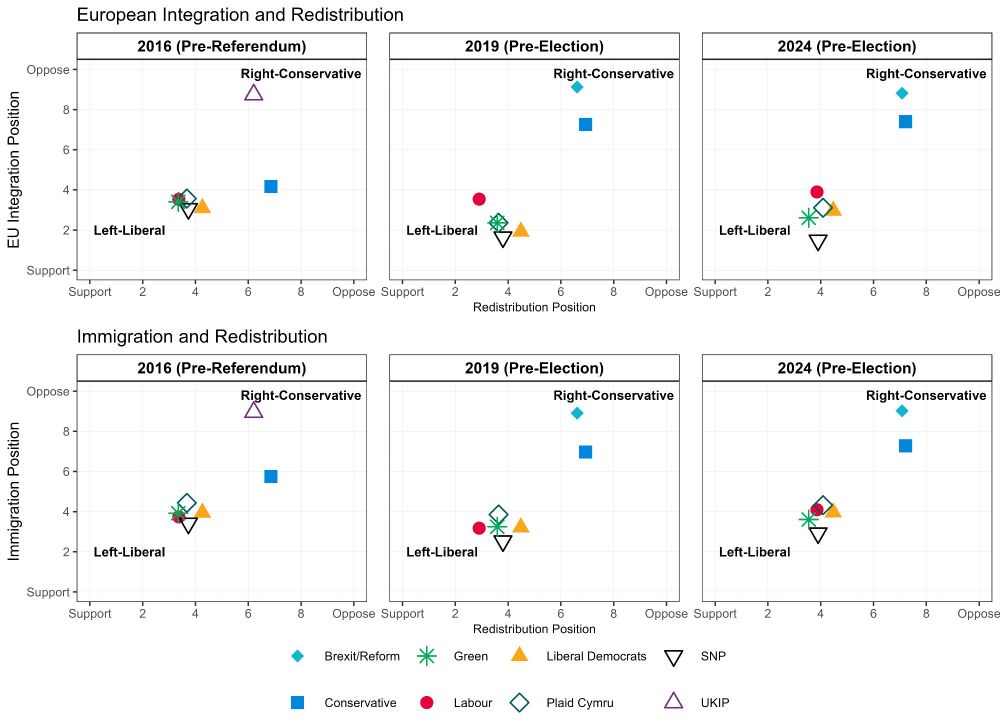
May 15, 2025 at 8:40 AM
We based our definition of the blocs on how the public perceive Labour, and they still clearly saw them as part of the left-liberal bloc on immigration and Europe in 2024.
Might have changed now though - and that will matter for their support!
Might have changed now though - and that will matter for their support!
We base that claim on the very low proportion of people who consider Brexit (or things related directly to Europe) to be the most important issue. We show Britain in the graph below, but it is very similar in each nation.
Unlike 2019, Brexit just isn't a priority for most voters.
Unlike 2019, Brexit just isn't a priority for most voters.
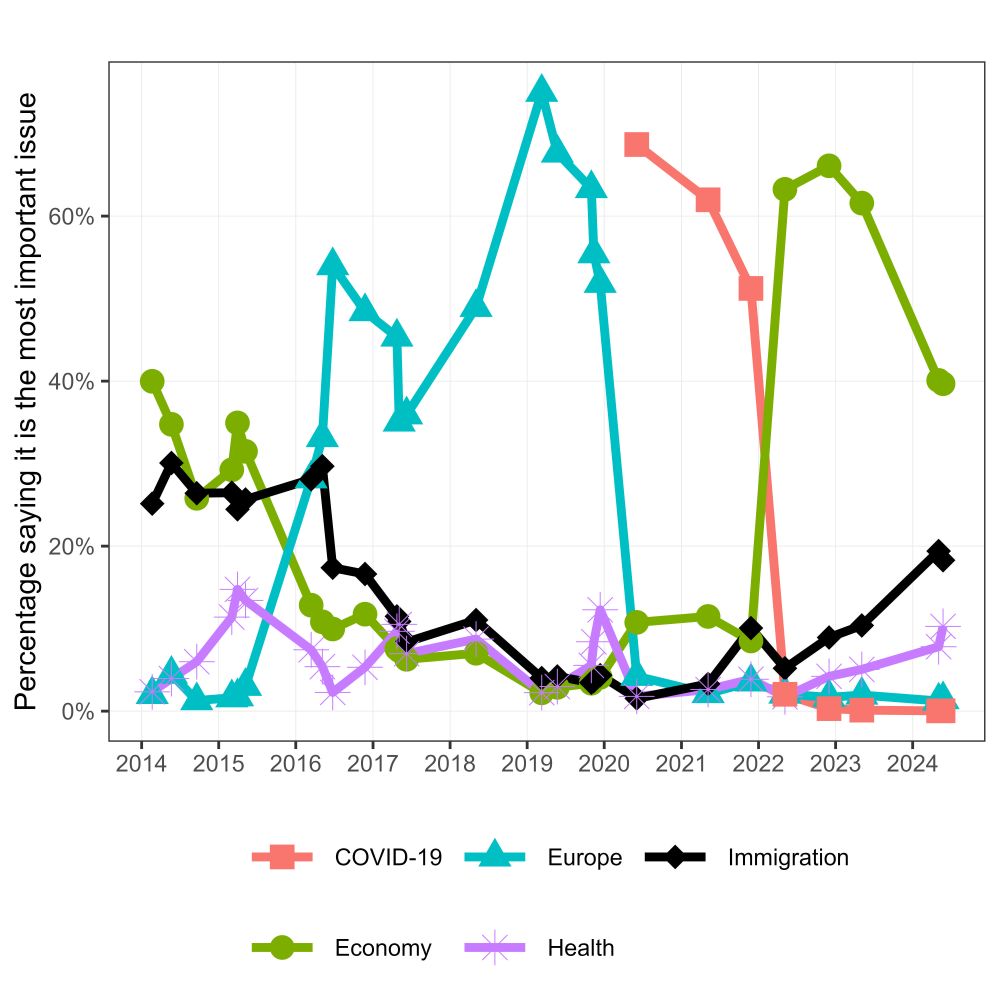
May 14, 2025 at 7:53 AM
We base that claim on the very low proportion of people who consider Brexit (or things related directly to Europe) to be the most important issue. We show Britain in the graph below, but it is very similar in each nation.
Unlike 2019, Brexit just isn't a priority for most voters.
Unlike 2019, Brexit just isn't a priority for most voters.
Here you go! From this paper that was published today!
academic.oup.com/pa/advance-a...
academic.oup.com/pa/advance-a...
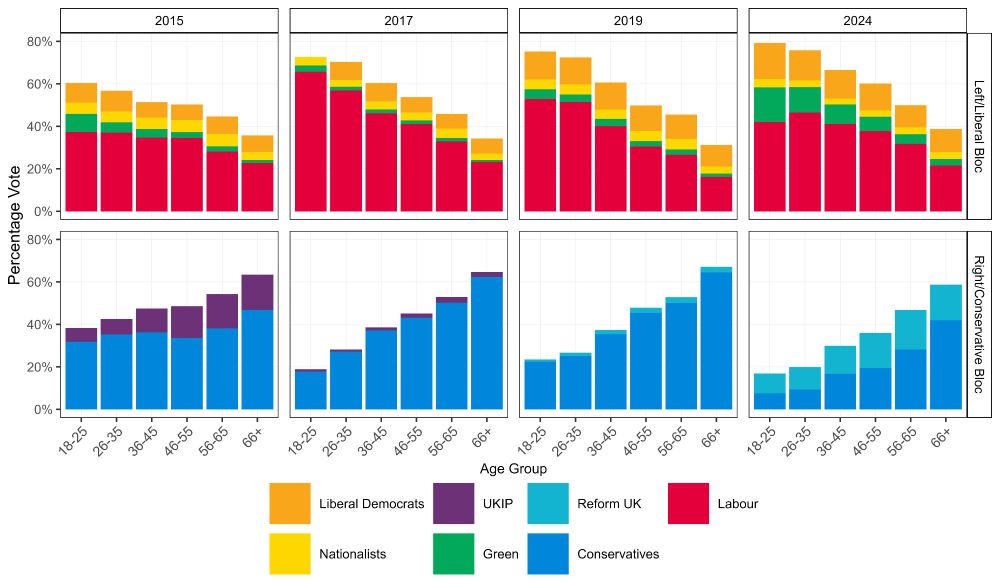
May 12, 2025 at 5:09 PM
Here you go! From this paper that was published today!
academic.oup.com/pa/advance-a...
academic.oup.com/pa/advance-a...
BONUS GRAPH
In 2024, Reform voters strongly disliked Labour – and vice versa.
Supporters of other left-liberal parties also disliked Reform.
It seems hard for Labour to make Reform voters like them (if they even could) without alienating their current or potential base…
In 2024, Reform voters strongly disliked Labour – and vice versa.
Supporters of other left-liberal parties also disliked Reform.
It seems hard for Labour to make Reform voters like them (if they even could) without alienating their current or potential base…
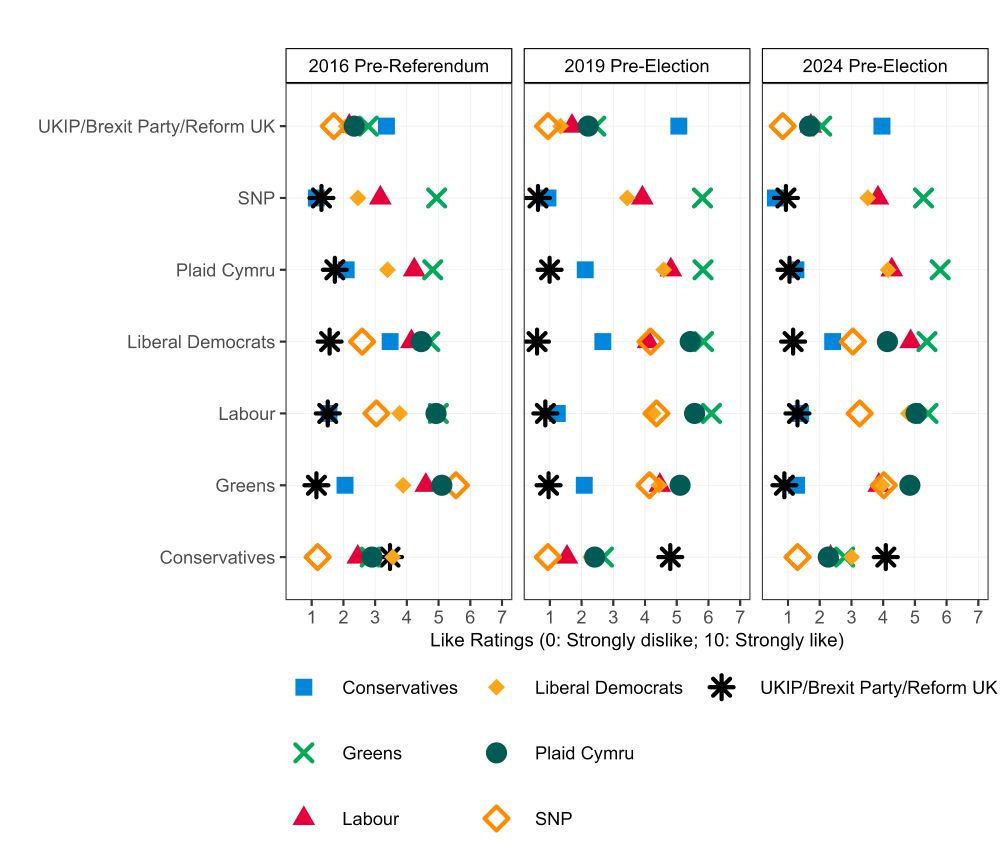
May 12, 2025 at 10:33 AM
BONUS GRAPH
In 2024, Reform voters strongly disliked Labour – and vice versa.
Supporters of other left-liberal parties also disliked Reform.
It seems hard for Labour to make Reform voters like them (if they even could) without alienating their current or potential base…
In 2024, Reform voters strongly disliked Labour – and vice versa.
Supporters of other left-liberal parties also disliked Reform.
It seems hard for Labour to make Reform voters like them (if they even could) without alienating their current or potential base…
Things are different in Scotland due to independence, but Brexit still helps structure vote choice.
Remain voters are closely aligned on Brexit, regardless of their position on independence.
No voters are less aligned (particularly the very small # of Yes/Leave), which independence helps explain.
Remain voters are closely aligned on Brexit, regardless of their position on independence.
No voters are less aligned (particularly the very small # of Yes/Leave), which independence helps explain.
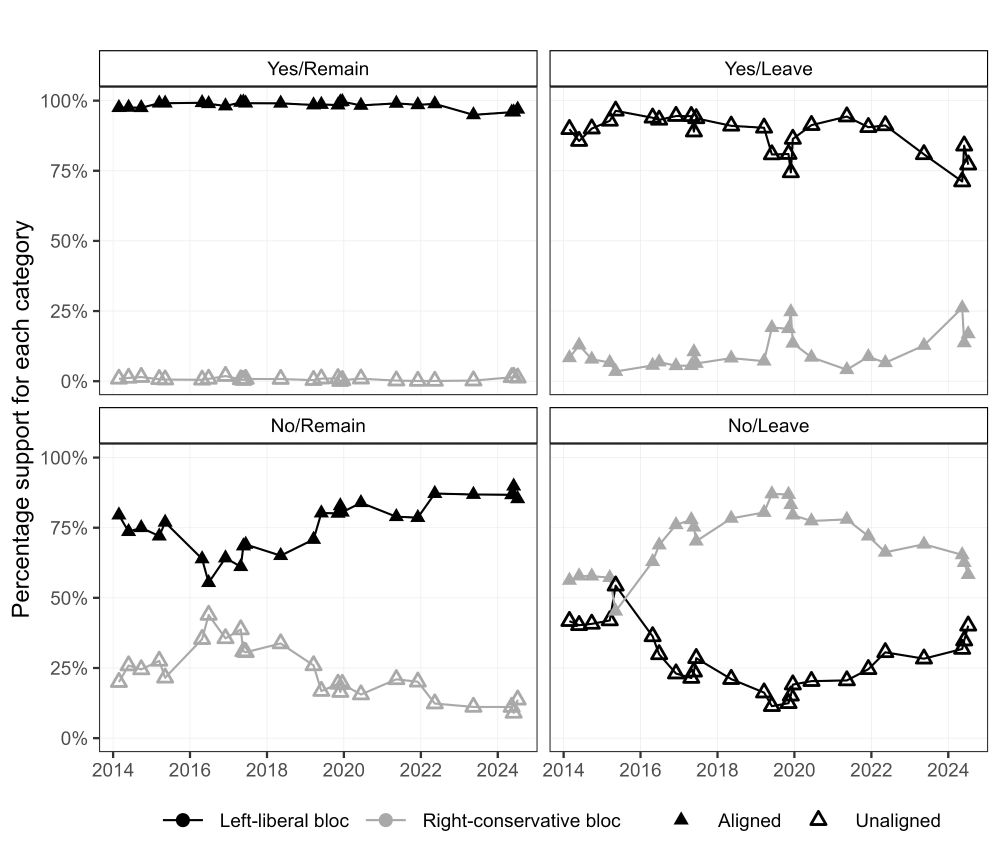
May 12, 2025 at 10:33 AM
Things are different in Scotland due to independence, but Brexit still helps structure vote choice.
Remain voters are closely aligned on Brexit, regardless of their position on independence.
No voters are less aligned (particularly the very small # of Yes/Leave), which independence helps explain.
Remain voters are closely aligned on Brexit, regardless of their position on independence.
No voters are less aligned (particularly the very small # of Yes/Leave), which independence helps explain.
This switching meant that the factors underpinning Brexit (age, education) predict support for party bloc.
Younger voters still overwhelmingly back left-liberal parties (fewer back Labour, more Greens in 2024), while older voters still back right-conservative parties. Same story for education.
Younger voters still overwhelmingly back left-liberal parties (fewer back Labour, more Greens in 2024), while older voters still back right-conservative parties. Same story for education.
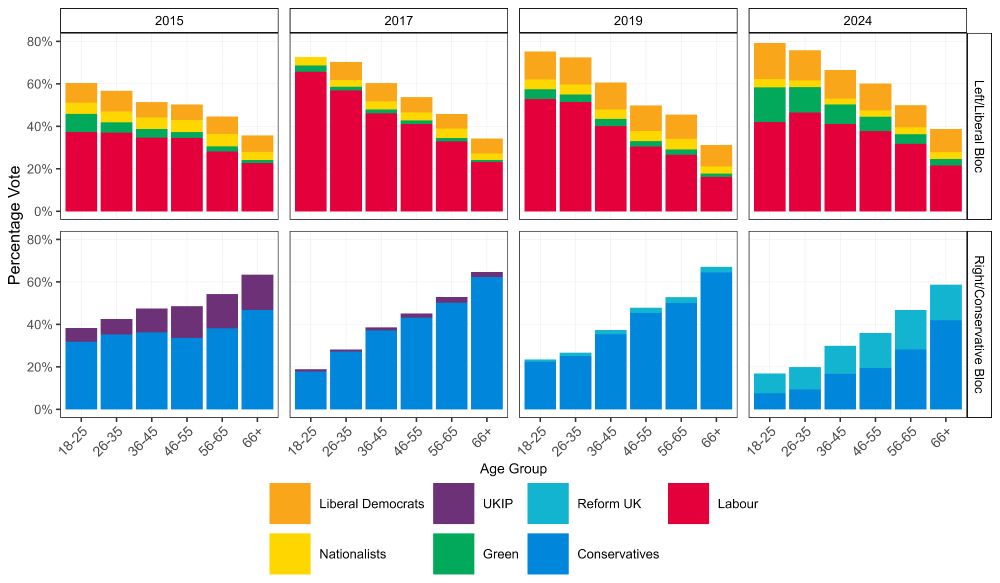
May 12, 2025 at 10:33 AM
This switching meant that the factors underpinning Brexit (age, education) predict support for party bloc.
Younger voters still overwhelmingly back left-liberal parties (fewer back Labour, more Greens in 2024), while older voters still back right-conservative parties. Same story for education.
Younger voters still overwhelmingly back left-liberal parties (fewer back Labour, more Greens in 2024), while older voters still back right-conservative parties. Same story for education.
Brexit no longer matters to voters, but they still separate the political parties into blocs that match their Brexit positions.
Looking at redistribution and immigration, voters separate the parties into ‘right-conservative’ (Tories, Reform) and ‘left-liberal’ (Labour/LDs/Greens) blocs.
Looking at redistribution and immigration, voters separate the parties into ‘right-conservative’ (Tories, Reform) and ‘left-liberal’ (Labour/LDs/Greens) blocs.
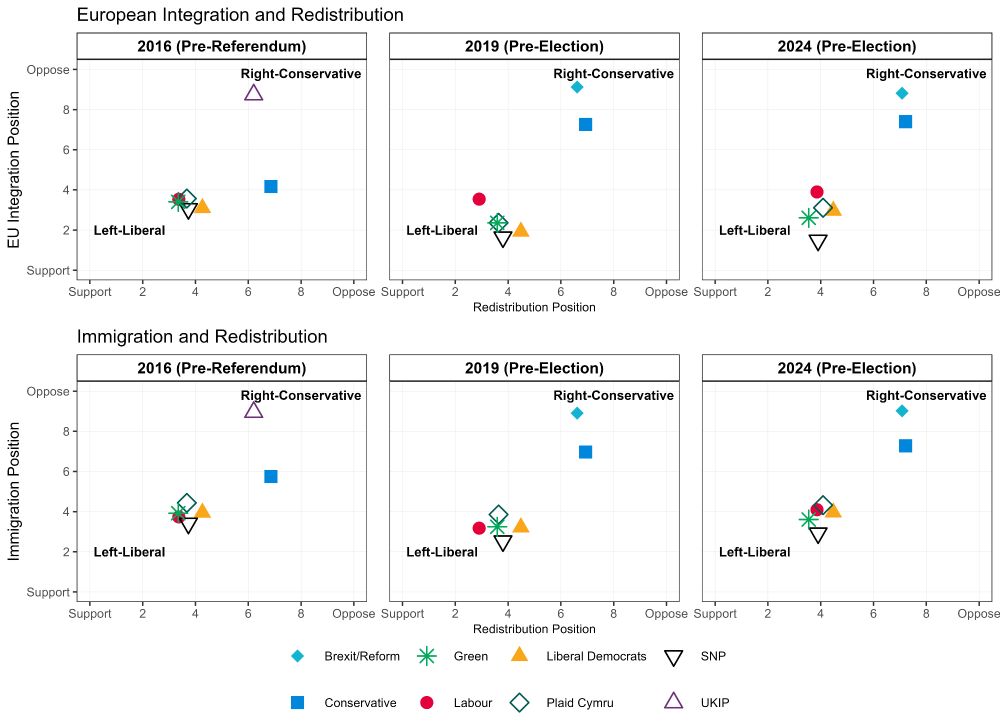
May 12, 2025 at 10:33 AM
Brexit no longer matters to voters, but they still separate the political parties into blocs that match their Brexit positions.
Looking at redistribution and immigration, voters separate the parties into ‘right-conservative’ (Tories, Reform) and ‘left-liberal’ (Labour/LDs/Greens) blocs.
Looking at redistribution and immigration, voters separate the parties into ‘right-conservative’ (Tories, Reform) and ‘left-liberal’ (Labour/LDs/Greens) blocs.
Despite the volatility, voters still backed parties based on their Brexit preferences.
On the Leave side, Reform got over three quarters of their vote from the Conservatives. There was a lot of churn on the Remain side, but Labour still got the most support.
On the Leave side, Reform got over three quarters of their vote from the Conservatives. There was a lot of churn on the Remain side, but Labour still got the most support.

May 12, 2025 at 10:27 AM
Despite the volatility, voters still backed parties based on their Brexit preferences.
On the Leave side, Reform got over three quarters of their vote from the Conservatives. There was a lot of churn on the Remain side, but Labour still got the most support.
On the Leave side, Reform got over three quarters of their vote from the Conservatives. There was a lot of churn on the Remain side, but Labour still got the most support.
The 2024 election was the most fragmented in British history.
The two major parties received their lowest share of the vote since the @britishelectionstudy.com began, with smaller parties growing in support, and over 40 percent of voters backing a different party to 2019!
The two major parties received their lowest share of the vote since the @britishelectionstudy.com began, with smaller parties growing in support, and over 40 percent of voters backing a different party to 2019!

May 12, 2025 at 10:25 AM
The 2024 election was the most fragmented in British history.
The two major parties received their lowest share of the vote since the @britishelectionstudy.com began, with smaller parties growing in support, and over 40 percent of voters backing a different party to 2019!
The two major parties received their lowest share of the vote since the @britishelectionstudy.com began, with smaller parties growing in support, and over 40 percent of voters backing a different party to 2019!

